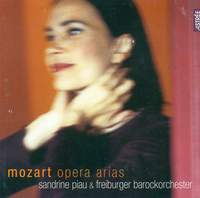Interview,
Sandrine Piau - Desperate Heroines
 With a clean, luminous voice that's equally happy setting off coloratura fireworks as it is when sustaining weightless long lines, French soprano Sandrine Piau has been one of the leading exponents of baroque repertoire and of Mozart's lighter lyric roles for almost two decades now: a long-standing favourite of the great baroque specialist William Christie, her extensive recording career has encompassed Rameau, Handel, Vivaldi and Couperin, whilst her stage roles have included French repertoire such as Mélisande, Sophie in Massenet's Werther and Soeur Constance in Poulenc's Dialogue des Carmélites as well as many of the 'desperate heroines' in Mozart who appear on her new disc for Naive.
With a clean, luminous voice that's equally happy setting off coloratura fireworks as it is when sustaining weightless long lines, French soprano Sandrine Piau has been one of the leading exponents of baroque repertoire and of Mozart's lighter lyric roles for almost two decades now: a long-standing favourite of the great baroque specialist William Christie, her extensive recording career has encompassed Rameau, Handel, Vivaldi and Couperin, whilst her stage roles have included French repertoire such as Mélisande, Sophie in Massenet's Werther and Soeur Constance in Poulenc's Dialogue des Carmélites as well as many of the 'desperate heroines' in Mozart who appear on her new disc for Naive.
I caught up with Sandrine this week to find out more about what makes Mozart's women so endlessly fascinating, and to ask a few questions about her vocal development and plans for the future…
It's over a decade since your first disc of Mozart opera arias: why is the time ripe for you to explore more of his heroines now? Do you feel your voice has altered very much in the interim?
Well after the first Mozart album, I needed to let time take its course. Over those years I’ve been given the chance to sing more mature Mozartian roles on stage, like Donna Anna and Sandrina. Those productions, plus other notable personal and professional life experiences, have all undoubtedly influenced my voice and my musicality.
That said, the voice itself has not changed fundamentally; it’s probably rounder, but I work on certain aspects, like keeping the ability to sustain pianissimi, which I guess is rather like my trademark. It’s definitely largely down to my personal development that has allowed me to tackle these new roles.
Have any of these characters played a special role in your development as a singer?
Definitely Pamina, from the first CD, as she represents a bridge from youth to maturity. Throughout life I try to keep an open outlook, certain naivety from childhood, balanced with the inevitable knowledge which comes with age. To keep this balance - it’s a life’s work!
Donna Anna is a troubled young woman, historically she is young, yet already exhausted by life and you have to be aware of both these aspects. That role opened new horizons and I felt comfortable singing it in my own way. It’s one of those roles which can be sung by a variety of voices, and it acted as a gateway to new experiences.
It's very unusual to see Barbarina's tiny cavatina from Le Nozze di Figaro included on a recital-disc, let alone opening one! Does Barbarina perhaps have hidden depths?
But the orchestral opening is so beautiful! It’s like a sad caress that gives a glimpse of the drama to come. Even though Barbarina’s anxiety seems mild in comparison to the other characters, to her it is very real. The count’s anger towards his entourage is horrific and Barbarina’s disarray is in this case, well placed.
What came first: the 'Desperate Heroines' theme, or the selection of arias? (Donna Anna, Ilia and Arminda certainly fit the description - but what about Susanna (who's usually portrayed as quite relaxed and happy at the point when we encounter her here) and the trouser-role of Aminta?
It’s true Susanna and Aminta are a little outside the box, but having said this, Susanna is pursued by the count, who wants to assert his droit de seigneur… in other words, to rape her before her wedding! It’s a desperate situation, yet she deals with it pragmatically and masterfully.
As for Aminta… yes it’s true, she’s actually a man.- a little twist to bring the disc to a close. It’s interesting to note that he speaks to his partner with so much serenity, love and happiness. Perhaps this total belief in a happy ending seems only a true possibility to male characters!!
In comparison with firebrands like Elettra, Vitellia and Donna Elvira, the heroines on this collection appear to be relatively passive: was that decision based on vocal or dramatic reasons, and is there perhaps more to these 'damsels in distress' than meets the eye?
You mention these strong characters that find total release both psychologically and vocally - that isn’t suited for my type of voice! The heroines on this album aren’t allowed (or don’t allow themselves) to express their rage or anger as Elvira or Vitellia can. As a rape victim whose father is murdered, Donna Anna’s internal pain leaves room for little else, not even anger, whilst Elvira feels love and lives for moments of hope even when she is betrayed. Ilia above all have to accept her political position, and her aspirations and feelings come second. They are absolute victims. In opera, this internalized pain is suited to soft voices…
You've included one of Donna Anna's arias here, often heard with a more dramatic voice: do you have any plans to take on any other slightly heavier roles in future, or do you find Donna Anna to be a special case?
As it happens, I have sung the heavier roles from this CD on stage – Donna Anna at the Theatre des Champs Elysée under the baton of Jean Claude Malgoire and Sandrina at the Monnaie in Brussels with John Nelson.
At the Monnaie, I’ve also sung the roles of Mélisande and the title role of Handel’s Cleopatra, which, with its 7 or 8 arias plus the duet, is one of the most challenging! Next January I will sing the title role of Alcina at the Monnaie, which will be really exciting and this summer at Aix I’ll play Tytania for a third time, in Robert Carsen’s magnificent staging of Britten’s Midsummer Night’s Dream.
I’ll never have a very true lyric voice, so for me it’s much more exciting to search for a good balance of roles, like a tightrope walker. I never give up the quest. The sweetness of a Pamina, or either Sandrina’s and Donna Anna’s suffering, they are now a part of me. And as long as the musical encounter with the conductor and the dramatic vision with director is positive, then the sky is the limit.
Desperate Heroines was released on Monday on Naive: The Guardian observed that '[Piau] is a thrilling Anna, and wonderfully stylish in the extracts from the early opera serias, Mitridate and Lucio Silla. She’s a very fine, intelligent artist'.
Available Formats: MP3, FLAC, Hi-Res FLAC
Piau's first Mozart arias album, from 2003, includes arias from Die Entführung aus dem Serail, Die Zauberflöte, La clemenza di Tito and more; the BBC enthused that 'It feels so easy and natural you'll probably find yourself grinning from ear to ear in delight.'
Available Formats: MP3, FLAC




